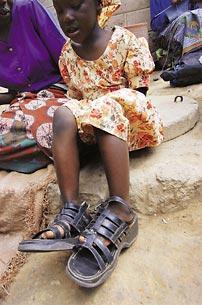 |
 |
| BETTY UDESEN / THE SEATTLE TIMES |
| Ruth Chimuonenji's daughter, Martha, is one of 11 million AIDS orphans in sub-Saharan Africa. As Martha becomes a woman big enough to wear her mother's sandals, she will grow up in a land where 50 percent of today's teenagers are expected to someday die of AIDS. |
|
 |
LISTEN TO RUTH'S MOTHER CRY, and you'll never think of the number 2.3 million in the same distant way.
That's how many people died of AIDS in sub-Saharan Africa last year. It's also the population of King and Snohomish counties. Seattle, Bellevue, Redmond, Renton, Everett — every soul from Federal Way to Stanwood, Vashon Island to Snoqualmie Pass.
Two million three hundred thousand. A number too big to get your arms around, an amount easier to calculate than to comprehend.
The distance between Seattle and Ruth's house in Harare, Zimbabwe, is 9,889 miles, 10 time zones, 31 hours on three planes. Downtown Harare to Ruth's street is a half-hour ride in a creaky green taxi, past the factories ringing the city, along a veld of tall grass. Turn left at a billboard for Protector Plus Condoms: Strong, Sensitive — A Friend for Life. You're in Mabvuku, a dusty township once known best for its fertile red earth. These days, it's indistinguishable from too many other African communities wracked by AIDS.
Until you hear Ruth's mother cry. If you've ever wondered whether 2.3 million deaths makes any single death less painful, listen. Imagine wind moaning, tires screeching, goats being strangled.
Ruth's mother is crumpled in the corner of her cinderblock home, wailing. She doubles over, forehead scraping the woven mat. Her tears leave a fan of dark stains. "My daughter! My daughter!"
Women crowd close for comfort. They've been there. Everyone here has lost someone to AIDS.
One of them starts humming, then another, and soon the house resonates with harmony, glorious song, the throb of a blue plastic drum. The music gives way to more wailing, which gives way again to song to ease the family's loss and help Ruth's spirit travel well.
For two days and two nights, while the men tend the fire outside, the women inside will clap and leap and cry, their grief amplified by the acoustics of a corrugated metal roof and the sorrow of so many mothers who've lost so many daughters so far.